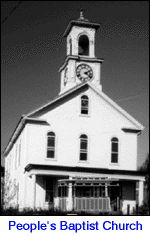|
FRESH STUFF DAILY |
|
|
||
|
|
||
|
|
||
|
SEE ALL SIGNED BOOKS by J. Dennis Robinson click here |
||
Page 3 of 4
Resolution
But this did not resolve segregation and hierarchy. Some churches appear gradually to have abandoned the practice, especially as the Quaker and Universalist doctrines of equality of all in the eyes of God became was absorbed into New England's major Protestant denominations. According to oral tradition, the brass "Negro" labels remained in St. John's until long after the practice of separate seating had lapsed. Their eventual removal signaled the emergence of white embarrassment about past segregation. In the 1950s and '60s Portsmouth's churches became leaders in the Civil Rights movement. Withholding the Message From an early date some New Englanders objected to the Christianization of Africans. Their reasons varied. Some felt Africans were not intelligent enough to understand it. Others didn't want to put themselves in the ambiguous position of enslaving baptized Christians. Such owners were highly likely to leave their slaves behind when they went to church. Tavern-keeper James Stoodley's ownership of a pew for his slaves Frank and Flora in addition to his own pew raises the question of whether all Portsmouth slave owners had to pay if they wanted seats for their slaves. This may merely indicate variable practice from year to year or church to church. If payment was a regular requirement, the absence of Negro pews from the inventories of slave-owners who had pews for themselves may indicate that many Portsmouth slave-owners didn't press church attendance on their slaves. Certainly the number of black people associated with Portsmouth churches rises at the end of the century, when an American-born generation was coming to maturity and increasing numbers of slaves were freed. Sunday Leisure In some New England cities many slaves were home unattended on Sundays. This was likely the case for some Portsmouth slaves too. In those other cities slaves spent their Sundays at informal markets, selling and buying produce from the personal garden plots they had negotiated from their owners. Working, buying and selling on the Sabbath scandalized the pious. Boston's colonial selectmen complained of slaves coming into town on Sundays "with corn, apples, and other fruit of the earth to the great disturbance of the public peace and scandal of our Christian profession". Such Sabbath markets provided black women an opportunity to exercise their traditional African role of trading. They also allowed unsupervised socializing. CONTINUE Black Worship, White Status Please visit these SeacoastNH.com ad partners.
News about Portsmouth from Fosters.com |
| Sunday, April 28, 2024 |


|
Copyright ® 1996-2020 SeacoastNH.com. All rights reserved. Privacy Statement
Site maintained by ad-cetera graphics

 Stories
Stories



 The white social complications of seating black people diminished when black churches were established and drew away black people. This happened in Portsmouth in the 1890s when People's Baptist Church was established.
The white social complications of seating black people diminished when black churches were established and drew away black people. This happened in Portsmouth in the 1890s when People's Baptist Church was established.














